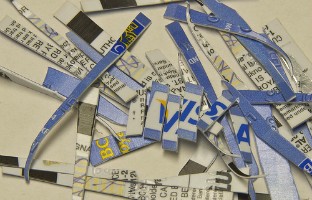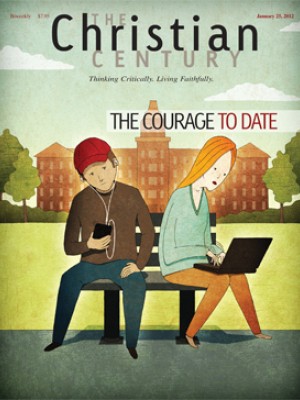Pay pals: A small group for debtors
Five years of putting Christmas gifts and vacations on credit cards had caught up with Scott Sorrentino. In the fall of 2010, the married father of three was carrying $6,000 in debt, and the chance to escape from it seemed years away.
"I'm more of a big-picture person than a detail person," he says. "I would sometimes put things on the card because I didn't know how much cash I had."
When Sorrentino's church started talking about a new "debt annihilation" program, his ears perked up. The concept: five debtors would make their minimum payments and then contribute an additional payment so that one of them could get out of debt completely. Then all five would continue paying so that all of them, one by one, would be out of debt within two years. If they could make the extra payment for someone else, they could make a payment for themselves.
The debt annihilation program at Circle of Hope, a Brethren in Christ church in Philadelphia, is not just about the money; it's about community and accountability.
"I don't have the discipline to do this on my own," Sorrentino says. "I'm just afraid I'm going to crash and burn. I wish I had enough love for myself to just do it for myself, but I'm here as a 40-year-old guy to tell you I don't have it on my own. I need my brothers and sisters."
Read our latest issue or browse back issues.
By emphasizing "incarnational" discipleship in small cell groups and intentional housing communities, members of Circle of Hope seek to live out the Great Commandment to love their neighbors, starting with one another. The 500-member church, which is divided into four separate congregations and 50 smaller cells, collected $8,000 in seed money from its members. That money erased one credit account for each of the four participants. Sorrentino saw half of his debt wiped away in one fell swoop.
"I really feel like this came from the Spirit," he says.
During the first ten months of the partnership, the church paid off more than half of the five members' $23,000 of debt. After using the seed money, the participants paid off another $4,600 of one member's remaining $5,500 debt. That particular balance became one of the group's biggest challenges: the debt belonged to a laid-off teacher who couldn't pay in with the others. The situation also challenged the original vision, which had been to pay off the highest balances or those with the highest interest rates. The crisis of unemployment trumped those goals.
The teacher "happened to be the person most in need of help," says Vanessa Caruso, who volunteers as the program's administrator. "It's definitely an attempt to redistribute resources and live out of a sabbath economy in a practical, real way."
The inability of the young teacher to contribute slowed the debt paydown, but it also fostered relationships as the other members helped him to find odd jobs and circulate his résumé.
"One of the goals is to know what sharing is like and to build community trust," said Caruso. "It's really become a group effort to find him a job."
The group has also struggled to decide whether to pay back the $8,000 in congregational seed money and reject continued donations from other church members. In the end, they decided to do both. (Individual debtors can still accept what Sorrentino calls "Pentecostal handshakes"—direct cash gifts from fellow church members.) Paying back the seed money means that the group will have to keep contributing for another year after all the debt is paid back, but Circle of Hope plans to start a second team, and the additional money will benefit that debt annihilation group.
"It doesn't end up just being a charity gift," says Caruso. "It's like their practice of being generous. It's an act of generosity, rather than paying back."
That's the ultimate goal: freedom from debt enables sharing with others. As one of Circle of Hope's lay leaders, Sorrentino had seen "wise brothers and sisters" conquer debt and gain "the blessings of using money well." But that learning could only happen in the context of open, honest communication about a taboo topic.
"The shame of having the debt was like a negative reinforcement," Sorrentino says. "Because I wasn't talking to anybody about it, and I had a sense of shame about it, it kind of kept me in that pattern."
Starting their group in the midst of the Christmas shopping season last year, the debtors took time to talk about the holiday's financial pressures. Sorrentino found the strength to spend less by buying a used drum kit for his son. Mimi Copp tries to live on about $15,000 a year so she can devote her time to urban peacemaking, but she has racked up nearly $4,000 in debt on medical bills and holiday travel over the years. This past Christmas she stayed in Philadelphia rather than going home to see her family in Indiana. She's also learned to use subsidized health clinics instead of for-profit doctors.
"I've been trying to live a middle-class life while having a lower-class income," she says. "I hadn't gotten myself into the mind-set of really how to get through life with the income I had. I didn't think about saying no to my family when I really should have."
The team members say paying off debts together gets them talking with one another, which not only helps them resist incurring more debt but also teaches them strategies for living within their means. Copp decided to start making Christmas gifts instead of buying them. She made a storybook for her nephew with photos of her life in Philadelphia and asked him to respond with a photo story about his life in Indiana. Sorrentino's family decided to take day trips instead of a summer vacation. Caruso says the members were relieved to be able to talk through an issue steeped in embarrassment.
These pioneers hope they have a model that could work in other congregations—the average American carries thousands of dollars in credit card debt.
"This is an experiment," Sorrentino says. "I think this could be a real revolution if people get over the shame."






